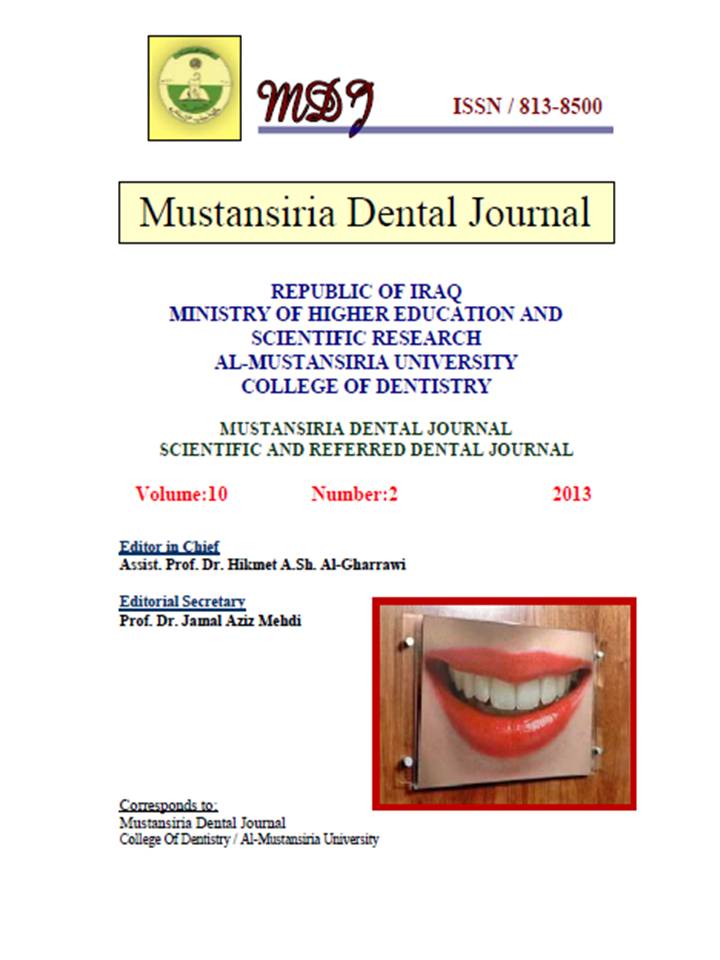The Role of K-Ras and PI3Kcb Expression in Oral Squamous Cell Carcinoma
DOI:
https://doi.org/10.32828/mdj.v10i2.230Keywords:
Key words: oral squamous cell carcinoma, signal transduction, Kras, and PIK3cbAbstract
Background: Oral squamous cell carcinoma is an aggressive malignancy. It arises
from premalignant lesions followed by outgrowth of clonal cell populations with
cumulative genetic alterations. Phosphoinositol 3-kinases are a family of related
intracellular signal transducer enzymes capable of phosphorylating the 3 position
hydroxyl group of the inositol ring of phosphatidylinositol (PtdIns).
Phosphatidylinositol-3-kinases involved in cellular functions such as cell growth,
proliferation, differentiation, motility, survival and intracellular trafficking, which
in turn are involved in cancer. RAS is a signal transduction protein for many
important cellular processes such as cellular proliferation, differentiation, and
survival by mediating the cell's response to extracellular stimulations. Kras, is a
protein within the RAS family, function in the same pathway of a Ras –Raf -Mek-
Erk-map kinase pathway which plays a role in mediating cellular response to cell
growth. Kras appears to be involved in signal transduction and cell cycle
regulation. To dates there has been limited previous investigation of protein
expression of both PI3Kcb and Kras in oral squamous cell carcinoma. This study
was performed to examin the expression of PI3Kcb and kras in oral squamous cell
carcinoma in comparison to normal oral mucosa and to correlate the expression of
both markers with clinicopathological findings including tumor grade and stage
and with each other.
Materials and Methods: This study included 31 selected cases of oral squamous cell
carcinoma pro and retrospectively and 10 cases normal oral mucosa. PIK3cb and
Kras expression has been detected by immunohistochemistry.
Results: Results of the present study revealed positive PI3Kcb and kras expression in
all examined oral squamous cell carcinoma cases. Immunostaining results for kras
& PI3kcb were detected as brown stain for cell membrane and cytoplasm in tumor
cells while there was no expression of both markers in normal oral mucosa. No
significant correlation was observed between both markers and the
clinicopathological finding of oral squamous cell carcinoma while highly
significant positive correlation was observed between the two markers.
Conclusion: The Present study provides additional evidence that Kras, and PIK3cb
over expression are common in contribution to oral squamous cell carcinoma
tumorigenesis, and that PI3Kcb signaling network plays an important role in oral
squamous cell carcinoma and thus, pathway-specific therapies targeting these two
pathways should be considered in the future treatment of oral squamous cell
carcinoma patients

Downloads
Published
Issue
Section
License
The Journal of Mustansiria Dental Journal is an open-access journal that all contents are free of charge. Articles of this journal are licensed under the terms of the Creative Commons Attribution International Public License CC-BY 4.0 (https://creativecommons.org/licenses/by/4.0/legalcode) that licensees are unrestrictly allowed to search, download, share, distribute, print, or link to the full texts of the articles, crawl them for indexing and reproduce any medium of the articles provided that they give the author(s) proper credits (citation). The journal allows the author(s) to retain the copyright of their published article.
Creative Commons-Attribution (BY)








